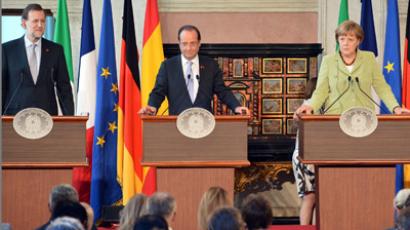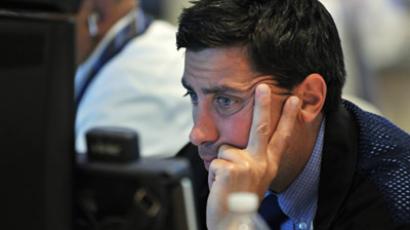EU mobilizes €120 billion for growth
EU officials have agreed to spend €120 billion “for immediate growth measures” to aid the most vulnerable countries of the eurozone. The announcement comes during the latest EU summit that has started in Brussels.
European Council President Herman Van Rompuy made the announcement at a summit press conference on Thursday. The leaders of Spain and Italy were reportedly blocking a final agreement on a stimulus package until they won promises of immediate help in reducing their borrowing costs, AP reports.However, after a tough night of bargaining, an agreement was reached that would allow loan money to be provided directly to troubled banks, circumventing European governments as middle men in the bailout process.Allowing money to be funneled directly to the banks was seen as a way to keep investor interest rates down by removing the debt from European governments; loans provided to governments might cause investor doubt, therefore driving interest rates to unsustainable heights. The move was beneficial for Spain, which has been seeking €100 billion in loans for its troubled banks.Another key part of the agreement was a reversal of EU policy stating that any new bailout applications would not be met with the same strict conditions that were imposed on previous bailout requests. This move was seen as one designed to placate Italy, who insisted that despite its troubled economy, it was not seeking a bailout at this time.The package includes a €10 billion capital increase for the European Investment Bank as the centerpiece of the long-term growth plan. It also includes infrastructure financing, tax-policy pledges and support of small and medium-sized businesses.It was originally presented by French President Francois Hollande, German Chancellor Angela Merkel, Italian Prime Minister Mario Monti and Spanish Prime Minister Mariano Rajoy in Paris last week. Hollande pressed for the EU growth pact during his election campaign as a balancing measure to the fiscal pact on budgetary discipline backed by Merkel.Earlier, Van Rompuy and European Commission President Jose Manuel Barroso also proposed creating a eurozone treasury to issue joint bonds to share the burden of debt-troubled countries. The proposal has been repeatedly ruled out by Angela Merkel, who is calling for the creation of a fiscal union before any further debt sharing.But while the eurozone continues to shelter incompatible economies, giving power away to “super bureaucrats” is unlikely to solve any problems, points out MEP Nigel Farage.“Basically, [Van Rompuy] wants the European Union to become a debt union, which may be acceptable to some of the southern countries who are effectively bust. To the northern countries, it is not,” Farage told RT. “The focus is always on Germany: will Chancellor Merkel blink or not?”Klaus-Peter Willsch, an MP from the German Bundestag said his country should not bear financial responsibility for the rest of the eurozone.“I cannot explain to my voters why German savings and German tax should go to financing deficits of other countries,” he told RT.Willsch, who is firmly against any further bailouts, explained that it had been discussed and agreed at the very origins of introducing the euro currency that each country in the eurozone would deal with its own financial problems.“We erected a legal framework which said strictly each country has to take care of its own budget, each country has to take care or has to limit deficits in their government budget, and there will be no bailout,” he said.EU leaders will also focus on creating a banking union as a fundamental step towards fiscal integration. They propose the setting up of a single European banking supervisor, as well as working out a common deposit guarantee scheme and a single bank resolution fund to stabilize EU banking.Both Italy and Spain have been pressing other European countries to intervene in the bond markets to bring down their borrowing costs before they are expelled from the market. However, it still remains in question whether EU leaders are eager to begin such purchases.















